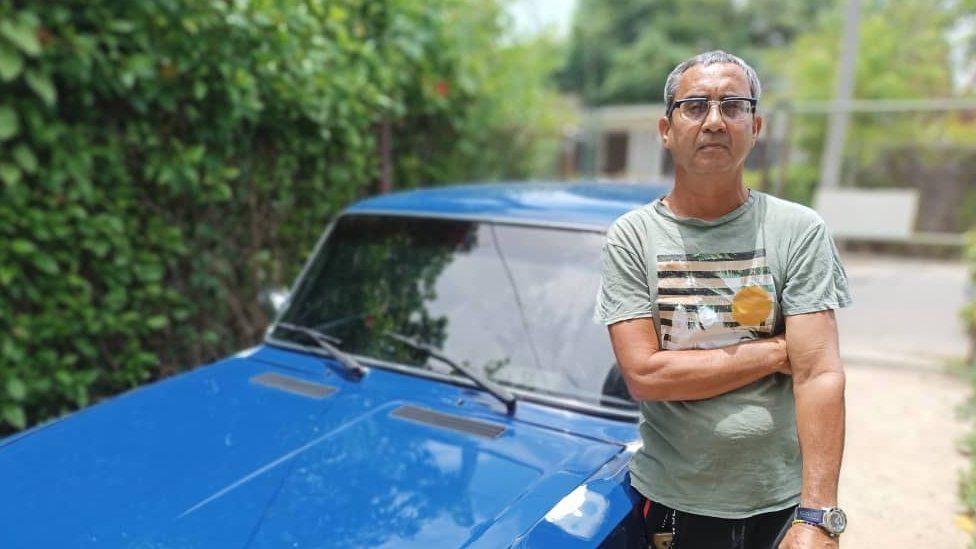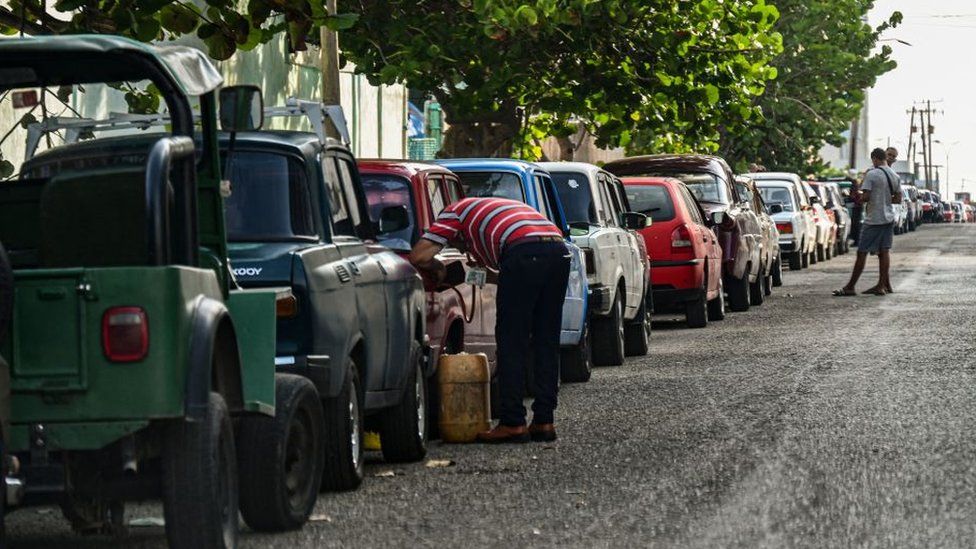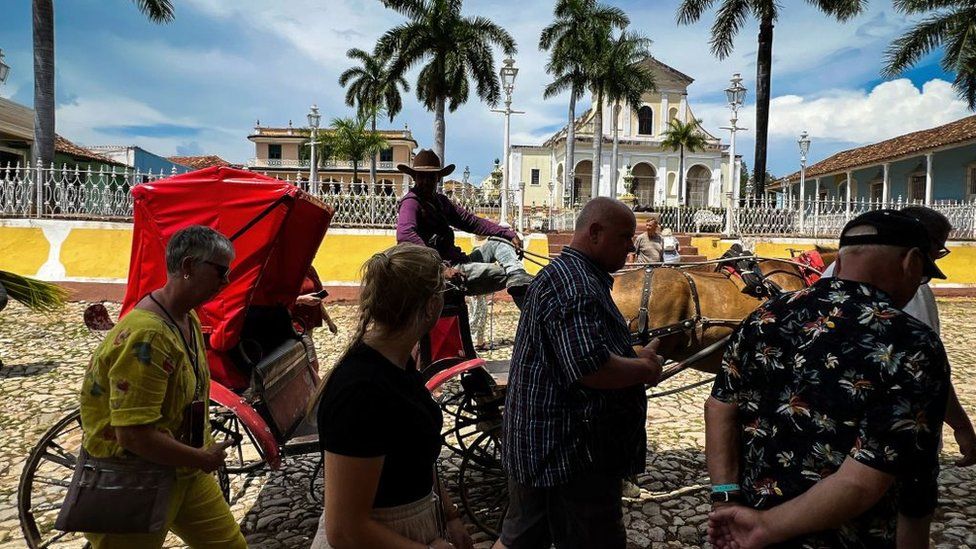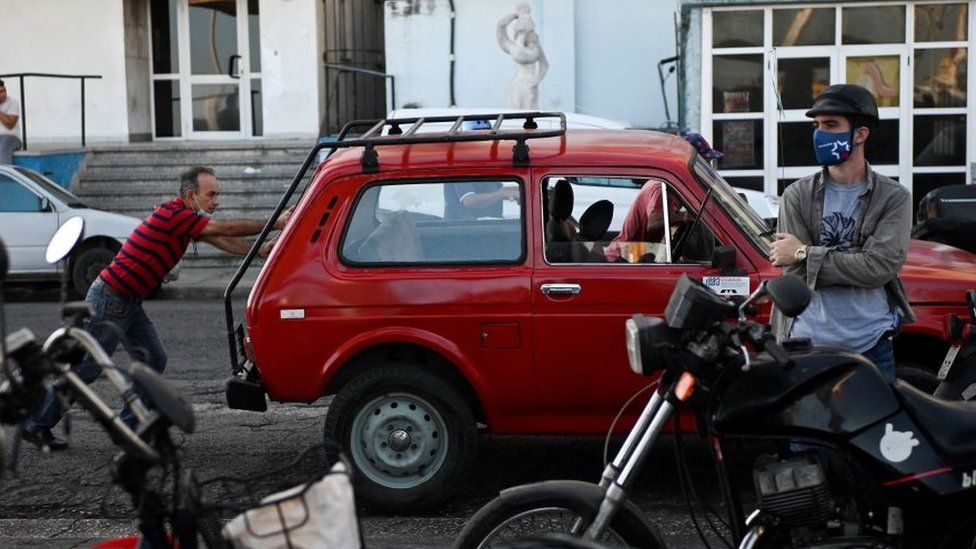Every time Jorge Lloro, a Cuban taxi driver, gets in his navy blue Lada from the Soviet era, he is reminded of his country's historical ties to Russia.
One of an estimated 100,000 cars made in Russia that were imported to the Caribbean island during the Cold War is his boxy vehicle.
Ladas have been arriving in Cuba over the years as a way to get around the long-standing US economic embargo on the country.
The island's leadership has once again turned to its longtime ally, Russia, for assistance as a result of a crippling fuel crisis and a bleak economic outlook. .
Because spare parts are expensive and hard to come by, Jorge has had to constantly fight to keep his car on the road. Even refueling the tank has grown into a multi-day process now.
At the height of the crisis, there were long lines of automobiles at the gas stations that extended over several city blocks.
The state eventually had to create WhatsApp groups for the throngs of waiting drivers. Your contact information would be recorded and a number would be given by a state employee. You would receive a call to come to the garage when it eventually came time for you to fill up.
Jorge informed us that he was number 426 as he guided us to a gas station in Havana after receiving an alert.

But when the tanker didn't show up, there was no gasoline flowing at the garage forecourt. Jorge remarked, "I don't know why they even told us to come.
Joel Hernandez, a different driver, echoed the frustration of everyone in the line when he said, "This system is inefficient and ineffective.".
People frequently forget their number or aren't told when it's their turn, so we're not allowed to fill an entire tank. Infrastructure and proper organization are lacking. ".
The fuel shortage has been driving the struggling Cuban people to the verge of despair for weeks. .
It's the most recent in a string of significant difficulties they've recently encountered, including food insecurity, inflation, and power outages.
The US economic embargo and government mismanagement are the main causes of Cuba's long-standing problems, which were made worse by the collapse of the tourism sector during the coronavirus pandemic. .
However, that has created a rare opportunity for some Russian businesses.
Cuba and Russian businesses signed a number of agreements at a recent trade forum in Havana that covered everything from energy to agriculture and tourism.

Concessions to Russian companies were among the agreements made in order to revitalize some of the island's deteriorating tourism infrastructure, including the Tarara beach resort.
Along with investments in the production of rum and steel, a joint project to renovate a dilapidated sugar mill in the province of Sancti Spiritus will also be undertaken. .
However, the deal for Russia to deliver about 30,000 barrels of crude oil per day is of most interest to Jorge and the other waiting drivers.
That would assist in making up for a shortfall in the island's domestic consumption after Venezuela, Cuba's socialist ally and oil-rich ally, reduced its crude oil exports to Cuba from 80,000 barrels per day in 2020 to roughly 55,000 barrels per day.
The Cuban state-run media hails it as confirmation of the long-standing ties between the two countries. Omar Everleny, the island's top independent economist, worries that Cuba's decision to forge closer ties with Moscow will only be a temporary solution.
"It's appealing that Russia steps in to stabilize that unstable situation when you're putting out fires on multiple fronts. However, the medium-term is where the issue is, he claims. .
According to Mr. Everleny, the Russian businesses will expect to be paid promptly and in full for providing the funds that Cuba so desperately needs.
These aren't Soviet businesses extending government loans. They are privately owned Russian companies, and they will expect a fair return on their investment. " .

He asks, in reference to Russian President Vladimir Putin's decision to forgive some $32 billion (£25 billion) of Cuba's debt in 2014, "Will that involve further sacrifices for Cuban families because we'll have to pay back those credits or will there one day be another Putin figure who'll forgive the debt?".
Undoubtedly, the new economic connections occur at a particularly complicated time.
Cuba has been one of Moscow's few vocal allies in Latin America since its invasion of Ukraine last year, something the Kremlin evidently values. .
Russian Defence Minister Sergei Shoigu was quoted in state media as saying: "Without a doubt, Cuba has been and continues to be Russia's most important ally in the region" during a recent high-level Cuban delegation visit to Moscow. ".
Perhaps, but according to economist Omar Everleny, Cuba cannot make the same mistake once again by depending on a single benefactor to rescue the island from its economic quagmire.
"It started with Spain, followed by the US, the Soviet Union, and then Venezuela. You cannot rely on one market, he asserts.
"I believe Cuba needs to develop its own production strategy, one in which Cuban small- and medium-sized businesses should play a significant role. " .
Jorge Lloro was finally able to fill up his Lada at the end of a scorching day outside the gas station.
However, it's basically on life support, only able to continue with Russia's assistance, and will need a significant makeover in the coming years, much like the Cuban Revolution itself.







